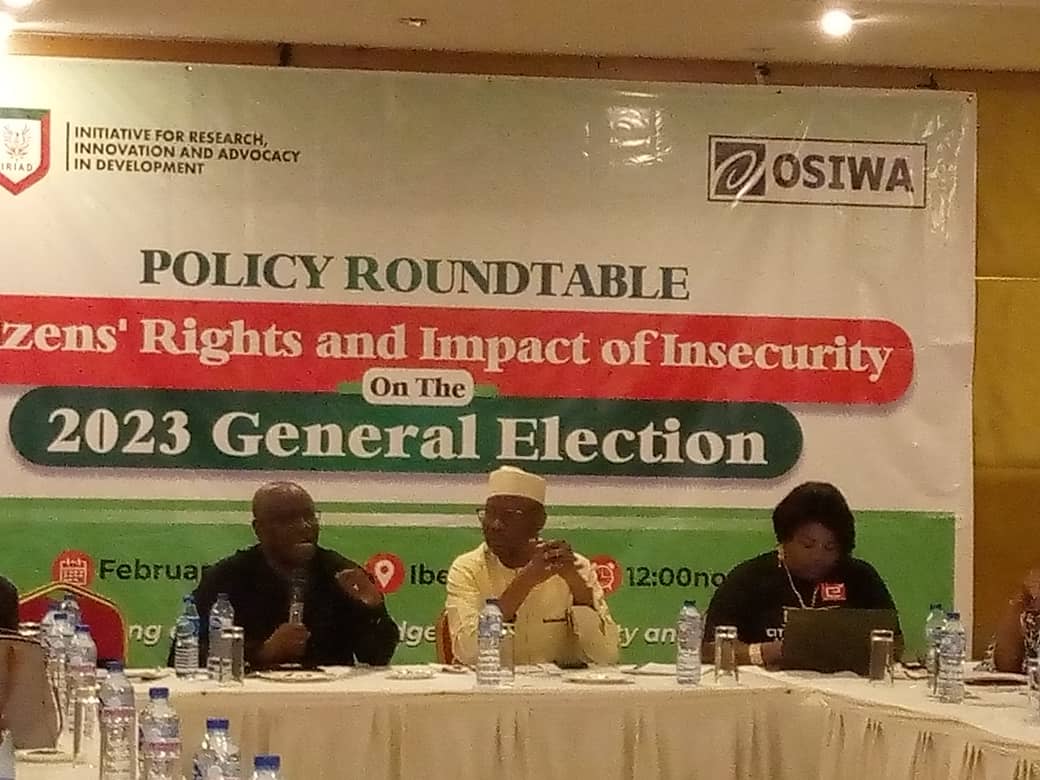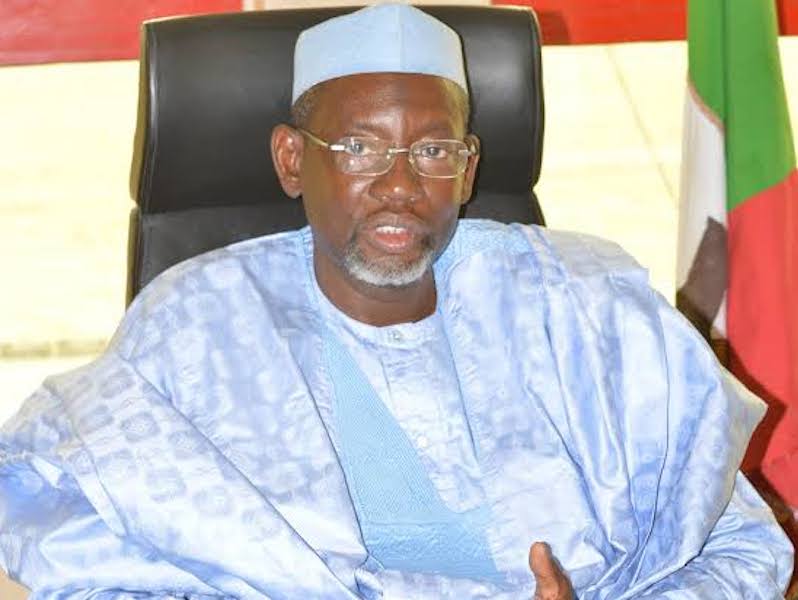By Chimezie Godfrey
Few days to the general elections, the Electoral Hub has convened a policy roundtable to proffer solution to the challenge of electoral violence in Nigeria.
The Policy dialogue tagged,”Citizens’ Rights and Impact of Insecurity on the 2023 General Elections”, was held on Tuesday in Abuja.
The project which was sponsored by the Open Society Initiative for West Africa (OSIWA), had in attendance representatives from the academia, civil society organisations, women group, disability group, and the media, among others.
Stakeholders identified the remote causes of electoral violence as voter suppression, structure of the society, political culture, nature of electoral administration and electoral management, logistics failure or technological failure, impunity and failure to bring culprits to book, among others.
Speaking on the threat of electoral violence during and after elections, the former National Commissioner, Independent National Electoral Commission, Professor Okechukwu Ibeanu said one of the remote causes of electoral violence in Nigeria was the fact that recommendations from various panels were not implemented.
Among other causes, Ibeanu mentioned voter suppression, logistic failure (technical failure) over deployment or non-deployment of security agents in certain areas, incitement/fake news & hate speech, polarization of civil society organizations, loss of confidence in the judiciary, lack of voter education, impunity and failure to bring culprits to book, rising expectations from the electorates especially the young people, among others.
He posited that what could be done in order to tackle electoral violence was the establishment of Election Administration Agency (EAA), and a system for holding people accountable for their actions.
Ibeanu said tackling the challenge of electoral violence needs the collaborative efforts all stakeholders, the INEC, security agencies, CSOs and the citizens as well.
He said,”One of the most causes of electoral violence in Nigeria, is the fact that the reports of investigation panels are never implemented. Practically every election in Nigeria has had this shroud of concern about violence around it. And it’s not just the general elections even small by-elections.
“So these have persisted. And as we move to the general election, you can understand why people are concerned that either during the election or in the aftermath, there may be violence, but what exactly is electronic violence and why does it occur?
“I think one way to begin to look at this is to say that Electoral violence is any violence that occurs around the election. There is the other extreme, which thinks about it as violence that is directly related to an electoral activity.
“There’s a tendency in the literature to look at electoral violence as something that is in a way part of the development of democratic and electoral structures, and that with time, this will pass a way, my sense is that it doesn’t seem to be so because if it was so, from election to election, we’ll continue to see decrease or reduction in electoral violence.
“So I think there are three factors that explain electoral violence. The first one is the one I call the political culture. And I’ve always said that political culture is so important in understanding electoral violence, especially the kind of political culture we have in Nigeria that is characterized by a lot of mistrust, a lot of winner take all mentality, a zero sum game mentality, and also the very, very pernicious role that money plays in our political culture.
“The second factor that I think is what I call the structure of the society, not just social structure, but also economic and political structure. And here you are looking at issues of the economy, perfect relationship amongst different segments of the society and so on and so forth, the nature of the state and so on.
“The third one, of course, is the most specific one, which is the the nature of electoral administration and electoral management, but it is one thing to identify these three but I think the more important thing in explaining electoral violence is how these three interact with each other to create violence.
“What all these mean for me in terms of the 2023 election, the ten issues I think that we should watch. The first one, of course, is the question of voter suppression.The second one is security. The third one is logistics failure or technological failure. The next one of course, is our triple problem of incitement, fake news and hate speech. The fifth one is the judiciary and their decisions. So, the sixth one, is rising expectations, especially among young people. The seventh one is, many of the elections in this general election are going to be very tight races.The eight one for me, is ignorance of people about how to arrive at the winner.
“I think the ninth one is impunity and failure to bring culprits to book. And it is also interesting that over 600 individuals were arrested after the 2011 violence. I don’t think that any one of them was prosecuted, talk less of being convicted, the final one for me is about civil society. Because I think that the whole question of holding actors accountable is a major responsibility of civil society. And if for any reason, as is beginning to manifest, there is a lot of division within civil society itself along partisan lines, then it is likely that they cannot come together to hold people accountable.
“And part of the problem is that people don’t perform their responsibilities and there is also no consequence for not doing so. So without going into any specificities about what we can do in this, I think if we all play the roles correctly, things will be better.”
Also speaking, the Senior Research Fellow, Centre for Democracy and Development (CDD), Professor, Adele Jinadu, decried the fact that law and order has not effectively been used to protect the citizens, adding that the rising spate of banditry, insurgency and other security challenges are as a result of the failure of the state.
Going into the general elections, Jinadu urged that more should be done to complement the effort of INEC in securing the environment that elections are conducted.
“Law and order has not effectively been used to protect the citizen, and that the spate of banditry, insurgency and so on as you see is a failure of the states to provide a security level of security that Nigerians will feel secure. This is not something that is new, it has been increasing over the years, because people have lost faith in the ability of the state to provide common basic things, and security for all that matter.
“I think in looking at the preparation of INEC for the elections, we need to separate what INEC has been doing. And I think since 2011. They’ve been doing their very best to prepare for elections. Learning lessons from from one election circle to the other. But what has not changed is the environment which elections are conducted and that is beyond the control of INEC.
“So, the spate of insecurity you are seeing now are people trying to get at INEC because of the failure of the state to provide certain which they are expected to provide. So, my conclusion therefore is that yes we should be concerned about if INEC is prepared, but we should be more concerned about what can you and I do to improve the environment within which elections are being conducted because that environment is beyond the control of INEC. But it is within our own control as citizens to take action to force government to comply with chapter two of our Constitution, which spells out the conditions for human security that all public authorities must guarantee to the citizen. And I think our governments have abysmally failed in doing that,” he said.
The Executive Director, The Electoral Hub, Princess Hamman-Obels, called on Nigerians not to allow themselves to be induced with money by politicians, adding that both the seller or buyer of votes are guilty of elections malpractice.
She urged citizens to promote peace and desist from hate speech, among other vices that would cause violence during the elections.
Hamman-Obels also called for inclusion of women and people with disabilities, while stressing the need for indebt voter education across the country.
She decried the current spate of insecurity that has led to the destruction of INEC offices, electoral materials, adding that this would adversely affect INEC’s preparations for the elections.
The Human Rights Activist equally empathized with Nigerians going through the prevailing economic hardship occasioned by the naira redesign policy of the CBN, and persistent fuel scarcity, as her heart went to mothers who could hardly feed their children.
She said,”This is the first time we have seen what looks like a very tight race election. Besides being a tight race election, there are lots of other indices. We are talking about the current happening, fuel scarcity, currency scarcity, a lot of other indices including the fact that there is a threat of voter suppression, there is general insecurity across the country which was what was occupying our mind initially. The insecurity in the South-East, North-East, and the other pockets of insecurity across the country,
“These will impact the elections. We know it will affect INEC’s preparations, I mean with the constant burning of INEC offices, election materials, these have impact on INEC, it means INEC will keep replacing the materials and need to also build up the offices that are being burnt, because they need to store materials for the elections, and they cannot store them in open places. The current fuel scarcity and currency scarcity is adding to this tension already, these cut across the whole nation, people can barely eat now.
“I had a lady talking about women not being able to feed their children, will they be able to come out to vote. Without over flogging issues, election and insecurity are very critical and is something that we should consider, it is timely now because the elections are just three days away. This calls for more introspection and reflection looking at how we can be more conscious in terms of security. So, basically this meeting, one of the reason we are holding it is so that we can come up with some actionable recommendations that will guarantee security and safety during the elections.
“But not just during the elections because we tend to focus on election day. That’s really the issue about post election period as well. We know in 2011 what happened it was after declaration of results that we had such violence, almost a thousand people died, and this election again, we’re having such tight contest, and we need to start thinking of how we can mitigate any possibility of violence.
We need to start thinking of how to engage at a deeper level of voter education to educate the public, for instance, in terms of how winners emerge.
“And vote trading, I call it trading because is buying and selling that takes place. Is not just the seller that is responsible, both the seller and the buyer they are doing malpractice, both things are electoral malpractice. And so we discourage that, and we advise against it. And we are seriously campaigning against it. Don’t sell your votes regardless of if there is cash scarcity or not. “Your vote, is your power”.
After extensive deliberations on insecurity and electoral violence, among other burning issues, stakeholders advocated for the unbundling of INEC to enable it function more effectively. This include the establishment of Election Administration Agency; and Political Party Registration Commission. Also, they called for implementation of recommendations made by the electoral committee of Uwais, professionalization of INEC, and citizens action, among others.



